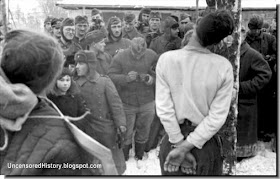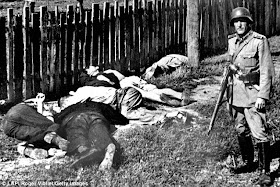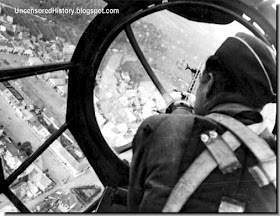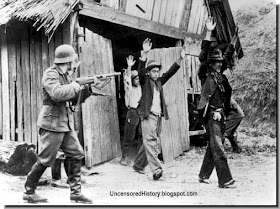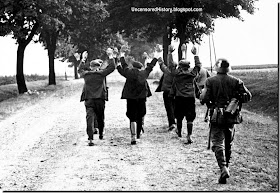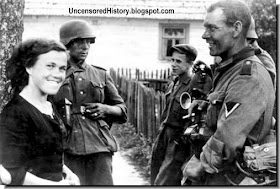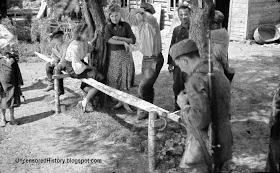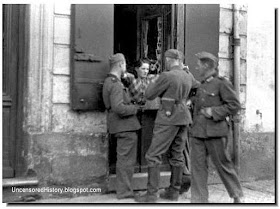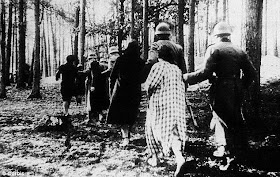For decades after the Second World War ended German soldiers from the Heer, Luftwaffe, and the Kriegsmarine have maintained that during the war they acted in the best traditions of a soldier and that they did not have anything to do with the horrors that the Nazis committed. But a new book "Soldaten" by Soenke Neitzel and Harald Welzer explodes the myth.
Even a great historian like Antony Beevor talking of rape by German soldiers in Russia says in his new book "The Second World War" that reports of rape were few. And that brothels were maintained for the soldiers.
In "Soldiers," which is subtitled "Transcripts of Fighting, Killing and Dying," the soldiers talk about their views of the enemy and their own leaders, discuss the details of combat missions and trade astonishingly detailed accounts of the atrocities they both witnessed and committed.
It is a disturbing book by two German historians which reveals the barbaric attitudes of some of the ordinary men who fought for Germany in the war and dispels the myth that chivalry played a role in the Luftwaffe during the Battle of Britain. It also suggests that millions of servicemen became brutalised almost as soon as hostilities began.
Two other pilots, Bäumer and Greim, also had their share of amusing experiences, which they described in a conversation with other soldiers.
Even a great historian like Antony Beevor talking of rape by German soldiers in Russia says in his new book "The Second World War" that reports of rape were few. And that brothels were maintained for the soldiers.
But some accounts in "Soldaten" blows away the myth. German soldiers brutalised by the war in Poland and Russia too committed many many horrendous crimes.
As if on picnic. German soldiers film a hanging in Russia
The material that historian Sönke Neitzel uncovered in British and American archives is nothing short of sensational. While researching the submarine war in the Atlantic in 2001, he discovered the transcripts of covertly recorded conversations between German officers in which they talked about their wartime experiences with an unprecedented degree of openness. The deeper Neitzel dug into the archives, the more material he found. In the end, he and social psychologist Harald Welzer analyzed a total of 150,000 pages of source material. The result is a newly published book with the simple title of "Soldaten" ("Soldiers"), published by S. Fischer Verlag. The volume has the potential to change our view of the war.
The recordings, which were made using special equipment that the Allies used to secretly listen in on conversations between German prisoners of war in their cells starting in 1939, offer an inside view of World War II. In doing so, they destroy once and for the myth of a "clean" Wehrmacht.
It is a disturbing book by two German historians which reveals the barbaric attitudes of some of the ordinary men who fought for Germany in the war and dispels the myth that chivalry played a role in the Luftwaffe during the Battle of Britain. It also suggests that millions of servicemen became brutalised almost as soon as hostilities began.
EXCERPTS
It is March 6, 1943, and two German soldiers are talking about the war. Fighter pilot Budde and Corporal Bartels were captured by the British a few weeks earlier. The war is over for them, and it's time to share memories.
Budde: "I flew two spoiling attacks. In other words, we shelled buildings."
Bartels: "But not destructive attacks with a specific target, like what we did?"
Budde: "No, just spoiling attacks. We encountered some of the nicest targets, like mansions on a mountain. When you flew at them from below and fired into them, you could see the windows rattling and then the roof going up in the air. There was the time we hit Ashford. There was an event on the market square, crowds of people, speeches being given. We really sprayed them! That was fun!"
Bäumer: "We had a 2-centimeter gun installed on the front (of the aircraft). Then we flew down low over the streets, and when we saw cars coming from the other direction, we put on our headlights so that they would think another car was approaching them. Then we shot them with the gun. We had a lot of successes that way. It was great, and it was a lot of fun. We attacked trains and other stuff the same way."
Greim: "We once flew a low-altitude attack near Eastbourne . When we got there we saw a big castle where there was apparently a ball or something like that being held. In any case, there were lots of women in nice clothes and a band. We flew past the first time, but then we attacked and really stuck it to them. Now that, my dear friend, was a lot of fun."
The Israeli historian Omer Bartov, a leading expert on the Wehrmacht wrote in 2003 that the Wehrmacht was a willing instrument of genocide, and that it is simply untrue that the Wehrmacht was an apolitical, professional fighting force that had only a few "bad apples". Bartov argues that far from being the "untarnished shield", as successive German apologists stated after the war, the Wehrmacht was a criminal organization. From the start of the war in Poland and culminating with Barbarossa and the Holocaust Wehrmacht led an informal "race war" and underwent gradual process of barbarization and nazification.
----------------------
--------------------------
*********
Zotlöterer: "I shot a Frenchman from behind. He was riding a bicycle."
Weber: "At close range?"
Zotlöterer: "Yes."
Heuser: "Did he want to take you prisoner?"
*********
The use of violence is an appealing experience, and it is one that comes much more easily to people than we have become accustomed to believing after 65 years of peace in Europe. Sometimes all it takes is a weapon or an airplane, as the following conversation between a German pilot and a reconnaissance soldier on April 30, 1940 reveals:
Pohl: "I had to drop bombs onto a train station in Posen ( Poznan ) on the second day of the war in Poland . Eight of the 16 bombs fell in the city, right in the middle of houses. I didn't like it. On the third day I didn't care, and on the fourth day I took pleasure in it. We enjoyed heading out before breakfast, chasing individual soldiers through the fields with machine guns and then leaving them there with a few bullets in their backs."
Meyer: "But it was always against soldiers?"
Pohl: "People too. We attacked convoys in the streets. I was sitting in the 'chain' (a formation of three aircraft). The plane would wiggle a little and we would bank sharply to the left, and then we'd fire away with every MG (machine gun) we had. The things you could do. Sometimes we saw horses flying around."
Meyer: "That's disgusting, with the horses…come on!"
Pohl: "I felt sorry for the horses, not at all for the people. But I felt sorry for the horses right up until the end."
*********
The victim is merely the target, to be shot and destroyed -- be it a ship, a building, a train or even a cyclist, a pedestrian or a woman pushing a baby carriage. Only in very few cases do the soldiers show remorse over the fate of innocent civilians, while empathy is almost completely absent from their conversations. "The victim in an empathic sense doesn't appear in the accounts," the authors conclude. Many of the bugged Wehrmacht soldiers also do not distinguish between civilian and military targets. In fact, just a short time after the beginning of the war, such distinctions did not exist except on paper. Following the attack on the Soviet Union, no distinctions were made at all.
Some soldiers are even particularly proud of having killed as many civilians as possible. In January 1945, Lieutenant Hans Hartigs of Fighter Wing 26 talks about a raid over England in which the goal was to "shoot at everything, just nothing military." "We mowed down women and children in baby carriages," the officer reports with satisfaction.
********
In October 1944, radio operator Eberhard Kehrle and SS infantryman Franz Kneipp had a casual conversation about the practice of fighting partisans.
Kehrle: "In the Caucasus , when one of us got killed there was no need for any lieutenant to tell us what to do. We just pulled out our pistols and shot everything in sight, women, children, everything…"
Kneipp: "A partisan group once attacked a convoy carrying the wounded and killed everyone inside. We caught them half an hour later near Novgorod . We put them in a sandpit, and then everybody started firing at them with MGs (machine guns) and pistols."
Kehrle: "They should be killed slowly, not shot."
*******
The story Lance Corporal Sommer tells about a lieutenant whom he served under on the Italian front shows how common it was to terrorize the civilian population:
Sommer: "Even in Italy , whenever we arrived in a new place, he would always say: 'Let's kill a couple of people first!' I could speak Italian, so I always got special tasks. He would say: 'Okay, let's kill 20 men so we can have some peace and quiet here. We don't want them getting any ideas!' (laughter) Then we staged a little attack, with the motto: 'Anyone gives us the slightest trouble and we'll kill another 50.'"
Bender: "What criteria did he use to select them? Did he just pull them out at random?"
Sommer: "Yeah, 20 men, just like that. 'Come here,' he'd say. Then he'd line them up on the market square, pick up three MGs -- rat-a-tat-tat -- and there they were, dead. That was how it happened. Then he would say: 'Great! Pigs!' He hated the Italians so much, you wouldn't believe it."
********
RAPE
Wallus: "In Warsaw , our troops had to wait in line in front of the building's door. InRadom , the first room was full while the truck people stood outside. Each woman had 14 to 15 men per hour. They replaced the women every two days."
Niwiem: "I have to say that we weren't nearly as respectable in France sometimes. When I was in Paris , I saw our soldiers grabbing girls in the middle of a bar, throwing them across a table and -- end of story! Married women, too!"
*********
RAPE
Müller: "When I was in Kharkov (in present-day Ukraine ), everything was destroyed except the center of the city. A wonderful city, a wonderful memory. All the people there spoke a little German, which they had learned in school. And in Taganrog (inRussia ) there were wonderful cinemas and wonderful beach cafés. I went everywhere in a truck. And all you saw were women doing compulsory labor."
Fausst: "Oh, my God!"
Müller: "They were building roads, drop-dead gorgeous girls. So we drove by, pulled them into the truck, screwed them and them threw them out again. Boy, they sure cursed at us."
*********
HOLOCAUST
Hardly any soldier says that he was directly involved, but many talk about what they saw or heard. The accounts are often astonishingly detailed and, in any case, much more precise than the information German investigators could later glean from witness testimony. In April 1945, Major General Walter Bruns describes what happened during a typical "Jew operation" he witnessed.
Bruns: "The trenches were 24 meters long and about 3 meters wide. They had to lie down like sardines in a can, with their heads toward the middle. At the top, there were six marksmen with submachine guns who then shot them in the back of the neck. It was already full when I arrived, so the ones who were still alive had to lie on top, and then they got shot. They had to lie there in neat layers so that it wouldn't take up too much space. Before this happened, they had to turn in their valuables at another station. The edge of the forest was here, and in here there were the three trenches on that Sunday, and here there was a line that stretched for one-and-a-half kilometers, and it was moving very slowly. They were standing in line to be killed. When they got closer, they could see what was going on inside. Roughly at this spot, they had to hand over their jewelry and their suitcases. A little farther along, they had to take off their clothes, all except their shirts and underpants. It was just women and little children, like two-year-olds."
German soldiers march Polish women to be shot in the woods
----------
Many Wehrmacht soldiers became witnesses to the Holocaust because they happened to be present or were invited to take part in a mass shooting. In one cell conversation, army General Edwin Graf von Rothkirch und Trach talks about his time in the Polish town of Kutno:
"I knew an SS leader pretty well, and we talked about this and that, and one day he said: 'Listen, if you ever want to film one of these shootings? …I mean, it doesn't really matter. These people are always shot in the morning. If you're interested, we still have a few left over, and we could also shoot them in the afternoon if you like."
http://www.spiegel.de/international/germany/rape-murder-and-genocide-nazi-war-crimes-as-described-by-german-soldiers-a-755385.html
-----------------------
A corporal called S. told how when his unit moved into villages in Italy after the collapse of the Mussolini government, the first task was always to murder a pair of civilians. ‘Then the chief said one day: “Kill 20 – that will stop them having stupid thoughts in future,” ’ he said. ‘So we went off and enjoyed ourselves so much that we didn’t stop until we had reached 50.’
------------------------
In another case, a senior German army officer voiced his disgust at a junior lieutenant's giggling account of how he and his men raped a so-called woman "spy" in Russia and then threw hand grenades at her. "She didn't half scream when they exploded near her," the lieutenant jeered.
